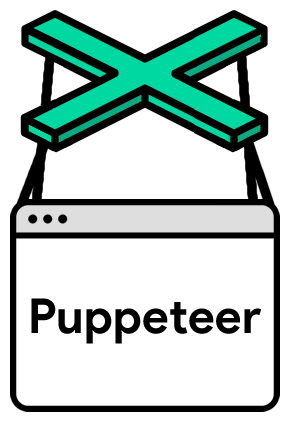- Simple: Quick to setup and integrate
- Standard: Just HTTPS + JSON
- Managed: Hosted via serverless functions
- Scalable: Scales to any capacity
- Usage based: Pay only for what you use
- Focused: We only do one thing and do it well
- Immutable deployments: All API updates are optional
Puppet Master provides hosted, serverless SaaS APIs for controlling headless chrome in the cloud.
Our goal is to make it really simple for developers to scale automated browser workflows via Puppeteer.
Navigates to a page and captures a screenshot via Puppeteer's Page.screenshot.
All Puppeteer options are supported.
Returns an image as either image/png or image/jpeg depending on the type parameter.
Navigates to a page and captures a PDF via Puppeteer's Page.pdf.
All Puppeteer options are supported.
Returns a PDF as application/pdf.
In addition to the standard parameters, all functions optionally accept a set of additional common options.
- viewport - Set the browser window's viewport dimensions and/or resolution.
- userAgent - Set the browser's user-agent.
- Useful to trick websites into displaying different content or styles based on an emulated device.
- gotoOptions - Customize the
Page.gotonavigation options.- Useful when you need to customize behavior around when Puppeteer considers a page navigation "finished".
- emulateDevice - Make it look like the screenshot was taken on the specified device.
- Use the
nameproperty from one of the built-in devices. - Overrides
viewportanduserAgent.
- Use the
Try setting viewport.deviceScaleFactor to 2 to emulate a retina display.
The differences can be broken down into two areas:
Functionality
- We use serverless functions to provide maximum scalability while minimizing cost.
- This also means that you only pay for what you actually use.
- You could set this up yourself, but headless chrome is a resource hog and who wants to setup and manage another async task queue?
- We also allow you to run functions locally which is essential for debugging.
Philisophy
The core motivation behind this project lies in trying to tackle the problem of open source sustainability.
Towards that end, every aspect of this SaaS product aside from the core functionality was generated automatically via Saasify, the Shopify for SaaS. That includes the template-based marketing website, OpenAPI-based API docs, serverless function hosting, user account management, usage-based billing integration, legal docs, and support.
It's our hope that by greatly simplifying and automating the process of launching SaaS APIs, open source authors will be much more inclined to monetize their work and help to sustain their passion while still holding true to the underlying nature of OSS.
Puppet Master is therefore a SaaS product that is fully generated from the source code in this repository. If you know how to create an open source TypeScript project like this one, you're already 95% of your way towards creating your own monetizable SaaS product!
We're actively looking for feedback and feature suggestions.
Please contact us or open an issue on this repo.
Thanks!
All APIs come with a free public tier that is rate-limited so you can test things out before signing up for a subscription.
Saasify uses Stripe to securely handle all payments, subscriptions, and invoices.
We use usage-based, metered subscriptions that charge fractions of a cent depending on three factors:
- Number of authenticated API calls
- Aggregate compute time
- Bandwidth in / out
Signing up for a subscription starts a weekly billing cycle. Note that you will only be charged for what you use.
See pricing for more details.
Collaboration is what makes open source truly powerful! If you're interested in working on Puppet Master or have an idea for your own Saasify product, please contact us to learn more. Thanks!
If your API calls are not working or returning unexpected results, the best way to troubleshoot is to try and reproduce your issue by running the project locally.
- Clone this repository
- Install
saasifyglobally vianpm install -g saasify - Run
saasify devat the repo root specifying an additional environment variablePUPPET_MASTER_DEBUG
PUPPET_MASTER_DEBUG=1 saasify dev
This will run the deployment locally with a non-headless browser and slowMo set to 1000.
Then just change the URL you're calling to be the corresponding localhost URL and investigate the issue.
MIT © Saasify
Support my OSS work by following me on twitter
